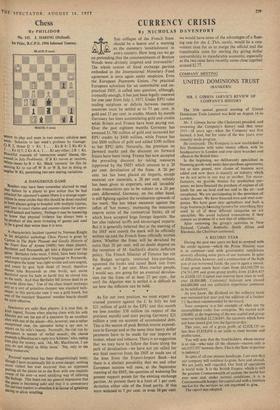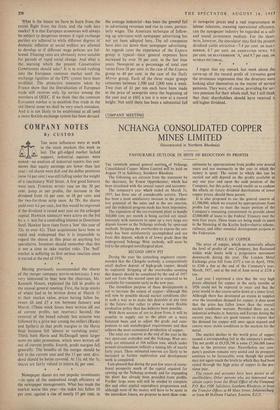CURRENCY CRISIS
By NICHOLAS DAVENPORT
THE collapse of the French franc should be a lesson and a warning
.to the monetary 'establishment' in
every country. How long can we go on pretending that the commandments of Bretton Woods were divinely inspired and irrevocable? The whole system of fixed exchange parities embodied in She International Monetary Fund agreement is once again under suspicion. Even the European Payments Union, the practical European substitute for an unworkable and un- practical IMF, is called into question, although, ironically enough, it has just been legally renewed for one year from July 1, 1957. Under EPU rules trading surpluses or deficits between member countries must be settled as to 75 per cent. in gold and 25 per cent. in credits. Month by month Germany has been accumulating gold and credits while Britain and France have been paying out. Over the past eighteen months Germany has amassed $1,700 million of gold and increased her EPU credits by $400 million, while France has lost $800 million of gold and added $300 million to her EPU debt. Naturally, the premium on forward marks and the discount on forward francs have been rising. France has now accepted the prevailing discount by taking measures (approved by the IMF) which amount to a 20 per cent. devaluation of the franc. A 20 per cent. tax has been placed on imports, except essential raw materials, a 20 per cent. subsidy has been given to exporters, and all 'invisible' trade transactions are to be subject to a 20 per cent. differential. Germany, on the other hand, is still fighting against the revaluation upwards of the mark. She has taken measures against the influx of 'hot money,' increasing the minimum reserve ratios of the commercial banks, all of which have accepted huge foreign deposits. She has also reduced tariffs and encouraged imports. But it is generally believed that at the meeting of the IMF next month the mark will be officially written up and the French franc officially written down. Whether the franc will be devalued by more than 20 per cent. will no doubt depend on the reception of M. Gaillard's drastic deflation policy. The French Minister of Finance has cut the Budget savagely, restricted hire-purchase, squeezed the banks and raised Bank rate from 4 per cent. to 5 per cent. Most market people, I would say, are going for an eventual devalua- tion for the franc of at least 25 per cent., for until the Algerian war is settled it is difficult to see how the inflation can be held.
As for our own position, we must expect in- creased pressure against the £. In July we lost $21 million of gold to the EPU and this month we lose another $38 million (in respect of the previous month) and start paying Germany $21 million a year on account of accumulated debt. This is the season of peak British tourist expendi- ture in Europe and at the same time heavy dollar payments have to be made for our imports of timber, wheat and tobacco. There is no suggestion that we may have to follow the franc along the path of devaluation—we have not yet called for/ our final reserves from the IMF or made use of the loan from the Export-Import Bank—but there is a distinct possibility that we and other European nations will raise, at the September meeting of the IMF, the question of widening "the present support points for the existing exchange parities. At present there is a limit of I per cent. deviation either side of the fixed parity. If this were widened to 5 per cent. or even 10 per cent,
we would have some of the advantages of a float- ing rate for the £. This, surely, would be a con- venient time for us to merge the official and the transferable rates for sterling (by giving dollar convertibility to transferable accounts), especially as the two rates have recently come close together around $2.77.
What is the lesson we have to learn from the recent flight from the franc and the rush into marks? It is that European economies will always be subject to dangerous stresses if rigid exchange parities are adhered to while different degrees of domestic inflation or social welfare are allowed to develop or if different wage policies are fol- lowed. Floating rates are obviously more suitable for periods of rapid social change. And what is the warning which the present Conservative Government should take? It is to avoid rushing into the European common market until the exchange rigidities of the EPU system have been modified. The protective measures taken by France show that the liberalisation of European trade still receives only lip service among the members of OEEC. If we think that the common European market is to establish free trade in the old liberal sense we shall be very much mistaken. And it is not likely to be established at all until a more flexible exchange system has been devised. the average industrial—has been the general fall in advertising revenues and rise in costs, particu- larly wages. The American technique of follow- ing up television with newspaper advertising has not yet been adopted here. The oil companies have also cut down their newspaper advertising. As regards costs the experience of the Express group is typical—their general expenses have increased by over 50 per cent. in the last four years. Newsprint as a percentage of total cost varies from 28 per cent. in the case of the Express group to 40 per cent. in the case of the Daily Mirror group. Each of the three major groups consumes between 1,500 and 2,000 tons a week. Two rises of LI per ton each have been made in the price of newsprint since the beginning of the year and at f60.1 a ton it is now at a record height. Not until there has been a substantial fall in newsprint prices and a real improvement in labour relations, meaning operational efficiency, can the newspaper industry be regarded as a safe and sound investment medium. For the short- term, however, the speculator may find the present dividend yields attractive-7.4 per cent. on DAILY MIRROR, 8.7 per cent. on ASSOCIATED NEWS, 9.6 per cent. on BEAVERBROOK 'A,' and 9.7 per cent, on
SUNDAY PICTORIAL.
* * * I regret that my remark last week about the carve-up of the record profit of VITAMINS gave the erroneous impression that the directors were looking after themselves in the matter of service pensions. They were, of course, providing for ser-
vice pensions for their whole staff, but I still think that their shareholders should have received a still higher dividend.































 Previous page
Previous page